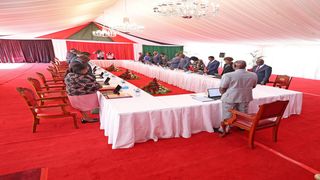
President William Ruto chairs a Cabinet meeting at State Lodge, Kisumu on October 9, 2023
| PCSOur Columnists
Premium
Without leverage, you will get nothing from power
Getting what you want or need from political power is all about leverage.
I found this out while serving as assistant minister for Industrialization a few years back. Initially, I was surprised when senior leadership insisted that we proceed with an ill-fated rescue attempt of Pan Paper Mills in Webuye.
Over several months, my ministry poured over Sh1 billion into the plant without much success at reversing its fortunes.
This despite my robust presentations to my political seniors to give us time to find a technically workable solution.
By way of background, the government was then one of the shareholders of Pan Paper. The crisis was precipitated by our management and technical partner, the Birla Group.
They had simply walked out, leaving a broke and debt-ridden enterprise. The business owed millions of dollars to local and international banks.
I had left International Finance Corporation (IFC) to join politics and government two years before. They were sympathetic and quickly agreed to write off the US$ 5 million owed them by the struggling paper plant.
And well they have, as it was them who back in the early 70s had structured the deal that brought the Birla Group to partner with government in the first place.
Management and technical agreements had by the late 2000s became quite discredited. These arrangements were initially touted as the best practice in attracting foreign direct investment.
In practice the agreements were often a disaster. They created incredible moral hazards. The incentive structures were all wrong .
Management partners got paid even when the enterprises they were managing did not make money. They could cook the books.
And they frequently did. They could buy inputs from their subsidiaries overseas, finding for themselves a comfortable route around then prevalent exchange controls.
Now in the 2009, having recouped their investment several times over, the partners walked away. The managers running the factory simply took the midnight flight to Mumbai.
And, by announcing the bail out plans, government gave away the game to the commercial banks. One European Bank immediately sold their debt to a vulture fund, which promptly started to exert pressure for payment.
But I digress. The political leadership were quick, direct and emphatic – bail out. Why? Simply put, the Western Kenya vote.
Both sides of the grand coalition could not afford to lose it. And the Western region’s political leaning was neatly split, half in each side. Our parliamentary colleagues from the region were themselves sharp and focused, as they agitated for the bail out.
Fast forward. A week ago, an MP from Mt Kenya complained bitterly on television about political betrayal.
The KK regime had just announced from State House, Kisumu, that they were backing the Sh117 billion bail out of the sugar sector recommended by the National Assembly the previous week.
The member was irked that both the assembly and the regime were completely ignoring the desperate pleas for a Sh6 billion rescue for the Central coffee sector.
During our ill-fated bail out of Pan Paper, none other than the chief whip, the late George Thuo, also complained. Which failing factories are you bailing out in Mt Kenya he asked?
While the MP and other colleagues might be bitter, here is the thing. You can only get what you want from power if you have leverage, and right now the region has none. By being in the current and previous regimes as individuals, Mt. Kenya political leaders find they have little political leverage.
Not only does the KK regime believe they have all the mountain votes, they effectively used leaders from the region to check mate the Jubilee Party, removing any voice that the region could have had in the National Assembly. It is not lost to observers that the sugar bail-out was recommended by the national assembly!
The members who have been leading a rebellion in Jubilee for the last year are from Mt. Kenya. They crossed the floor to work with government for the “sake of development”.
Why are they unable to secure support for coffee, while their colleagues, who have remained steadfast in the opposition, can walk home with a serious rescue package for the sugar sector?
It must be embarrassing for them, having made a big show of coffee revival, complete with a widely publicised conference in Meru, to then seek and miss “a mere Sh6 billion” as the MP put it.
It must be humbling to fly home to a small unlit field called Nyaribu from the well-appointed Kisumu International Airport, having launched the brand-new marine vehicle Uhuru II on Lake Victory. It must bring out the searing question. What is power for?
But the region has not always acted in unison on the questions of power and leverage. In both the Kibaki and Uhuru administrations, Meru stood out.
While fully supporting both governments, they always able to negotiate for more than their neighbours.
Their local political arrangements, including having their own political parties, enabled them to have leverage and effectively negotiate with power.
This happens often in coalition governments in Europe. Political parties with 20 or 30 MPs enjoy lots of power because a government can fall, if they withdraw from the coalition.
@NdirituMuriithi is an economist





